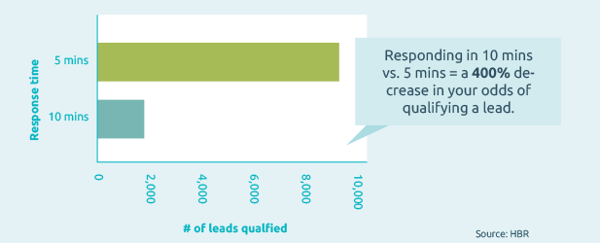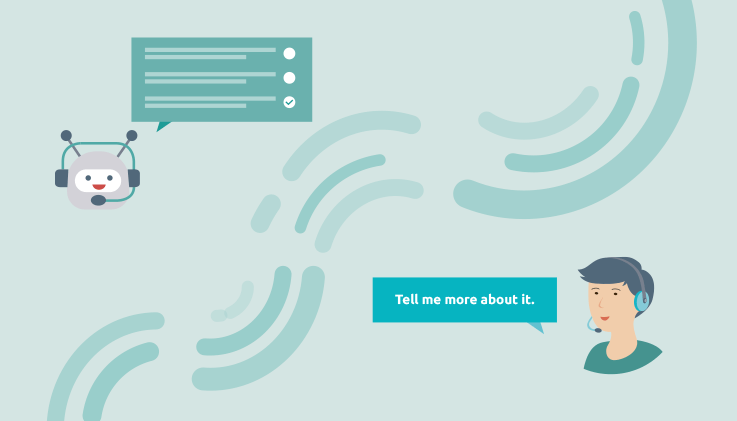Are chatbots better than people at scaled communication?
This question has a myriad of objective truths hidden behind it. We’re all witnessing the wave of automation in customer service. Industry leaders are now forecasting advanced AI-powered responsive chatbots to take over at scale like never before. Gartner suggests that 47% of organizations will use chatbots for customer care, and 40% will deploy virtual customer assistants (VCAs).
AI is helping customers get answers to a plethora of essential queries before they interact with a live agent. Agents can then review cases individually and focus on time-sensitive tasks identified during customer exchange with chatbots.
Living in an increasingly automated world
There is evidence that automation has proliferated contact centers. Customers prefer using an automated responder to long waiting hours.
Gartner predicts that by 2021,
more than 50% of enterprises will spend more per annum on bots and chatbot creation than traditional mobile application development.'
Therefore, chatbots can be viewed as an extension of the human customer support team rather than a substitute technology. Real people are still necessary to operate at higher-quality levels, while chatbots can communicate with consumers at the preliminary stage.
Converting dissatisfied customers
The most important function that an AI chatbot performs is converting dissatisfied customers to happy customers. Disappointed customers are more likely to spread a negative perception of a brand on social media or to immediate family and friends. For a growing brand, there is limited scope in capturing the extent of negative conversations online and offline.
That’s why chatbots effectively capture negative feedback at the source of the conversation and help contact centers understand the drivers behind negative feedback. This helps agents resolve the issue faster and escalate issues to appropriate teams if required.
Research suggests that companies lose over $62 billion annually due to poor customer service. Also, 74% of customers will switch brands if they’ve had a negative experience with the purchasing process.
Also Read: How to Deal with Difficult Customers: 5 Tips
Converting difficult customers should be a focal point for businesses that want to enhance growth.
Maintaining quality customer relationships
It’s no secret that maintaining quality relationships is important in any industry. Harvard Research predicts that it is 5 to 25 times more expensive to acquire a new customer than it is to keep an existing one. As the cost of acquisition rises and more options open up, it’s important to keep customers happy.
That’s where AI chatbots come in and provide a better customer experience. AI can handle a large number of incoming queries while providing quicker resolution to cases. Customer service technology supplemented with AI ensures that customers have a positive experience when dealing with agents.
Even when maintaining internal compliance and policies, AI can be programmed to operate under certain conditions. While human agents may be prone to social engineering or extraction techniques, AI bots are trained to comply with all conditions. This standardizes customer communication and increases retention in the long term.
Also Read: The 6R's of an Awesome Customer Service
Focusing on true value for operational excellence
Operational excellence is the goal of every forward-looking organization. When hundreds of customer queries pour in, and leads flow out of the landing page, a chatbot is the single most effective solution. That’s why companies integrate chatbots into their systems. It allows them to scale and helps secure multiple layers of customer conversations. Since the cost per conversation decreases as scale increases, companies are seeing benefits from the moment they launch.
When it comes to true value in communication, chatbots beat real people. They usually have a faster response time than human operators, and businesses witness an increase in the odds of qualifying for that lead.
 However, this doesn’t imply that chatbots are decisively better than human agents. When it comes to quality conversations and establishing trust, a human agent is far more effective. As AI chatbots become increasingly smarter, that divide might get smaller. At this stage, companies need a hybrid approach to chatbots and human agents. Both are necessary to create a functional communication model when handling queries.
However, this doesn’t imply that chatbots are decisively better than human agents. When it comes to quality conversations and establishing trust, a human agent is far more effective. As AI chatbots become increasingly smarter, that divide might get smaller. At this stage, companies need a hybrid approach to chatbots and human agents. Both are necessary to create a functional communication model when handling queries.
Also Read: Human-Machine Collaboration
Customer service as an asset
Chatbots may allow companies to leverage customer service as an asset. They can invest in enhancing the technological capabilities of the chatbots and develop the domain as a true asset. They can fully integrate human agents with Artificial Intelligence chatbots to create a functional unit that is an asset. They can leverage the asset in the public sector or acquire new customers based on this strength.
The overall approach of businesses is shifting to incorporate new technologies into their customer service department. AI is one of the premier technologies allowing businesses to do so. With the help of AI chatbots, human agents feel more empowered and capable of handling complex customer queries.
Also Read: AI, Robots and Knowledge Workers: The future of the workplace
Keep the right balance: scale your customer experience
Responding faster can be a key differentiator when converting a lead or a potential customer. It’s only going to make the customer experience better.
Outdated live-chat applications are no longer a feasible solution. Support agents now adopt AI-powered responsive chat for a faster first response time. Customers don’t appreciate waiting for help only to receive a message asking them to call them or visit FAQs.
Chatbots may be better than people when it comes to query resolution and up-selling while communicating. With new advancements in voice and text chatbots, there is significant scope to create better value via AI-enabled chatbots. Thankfully, with AI-powered chatbots, like that of ThinkOwl, customer interactions are more context and intent-driven. It’s easy to train the AI bots with real customer conversations to deliver personalized support round the clock.
These empower real people to close leads faster and increase retention among core customer groups. So, the hybrid approach of agents and bots collaborating is the best way to nurture customers and drive sales fast.
With ThinkOwl, you can automate customer communication and sustainably boost your company's productivity in customer support. Sign up now for a 30-day free trial.
